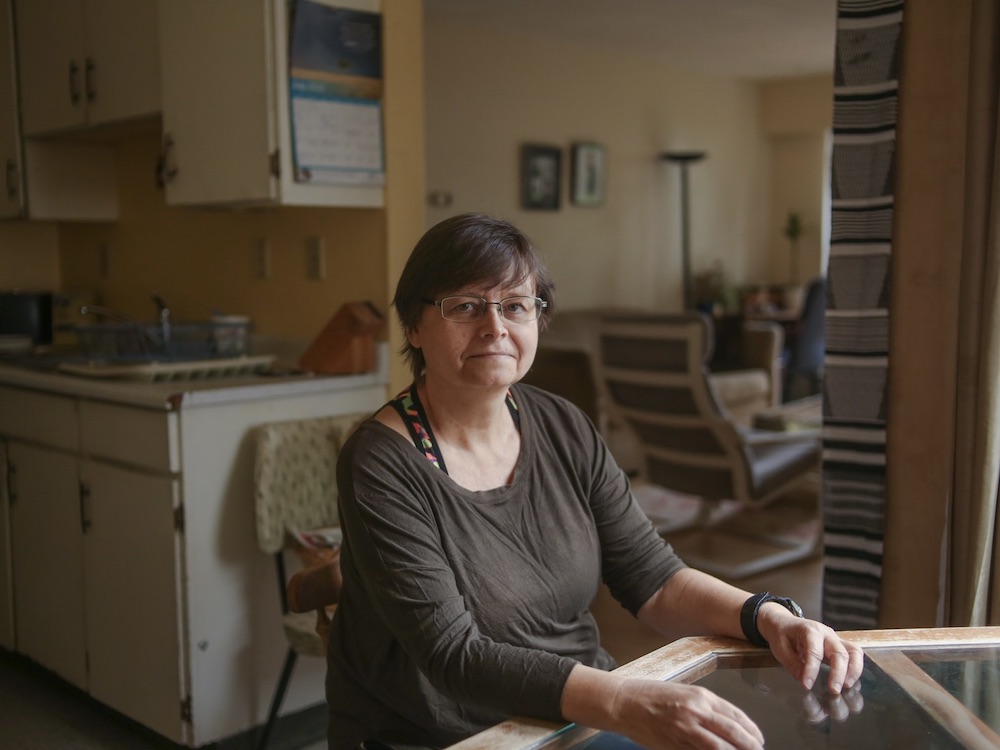In the summer of 1999, Renee Bernard cruised Vancouver’s Mount Pleasant looking for a place to rent.
It was a different market back then, with a healthy vacancy rate close to three per cent. She passed sign after sign on lawns announcing availabilities and cable TV in big letters. Mount Pleasant is known for its stock of apartment buildings, some over a century old, clad in beautiful brick. But the home that caught her eye was the roomy corner unit on the second floor of a wood-frame walk-up.
“The landlord wanted me to sign a one-year lease and I was nervous,” said Bernard, who was used to moving around. “But I signed.”
That deal was $625 a month for a one-bedroom unit, about $60 cheaper than the market average at the time.
“I knew I had a sweet deal,” said Bernard.
It wasn’t just the rent that was good — the home was a spacious 800 square feet, all the more impressive as new condos have shrunk to almost half that size. Bernard’s rental has three double closets, the bonus windows that come with corner units and a bedroom big enough for her double bed and her 13-year-old son’s loft bed, for when he stays over. And in village-like Mount Pleasant, Bernard, a part-time radio journalist, has always walked to work.
On top of that, her deal of a lease sweetened over time. Thanks to her willingness to sign 23 years ago — and her landlord choosing not to increase the rent for the first 10 years — what she’s paying monthly now is about $500 cheaper than the market average.
Her rent is $878, a remarkable rate for a home like hers in 2022.
A foot in the door
You might hear about unicorn rentals like these every once in a while because of how B.C. has chosen to legislate rent control.
B.C. allows rent increases every year based on the province’s average inflation. Before 2018, the allowable increase was even higher, with the province allowing the average inflation plus another two per cent.
This means that the earlier a person gets their foot in the door of a rental, the lower their starting point when it comes to rent increases.
For example, imagine if Person A starts at a monthly rent of $900 one year and Person B starts at $1,000 the following year. Over time, based on B.C.’s inflation-based annual increases, the gap between what Person A and Person B pays will continue to grow.
But being Person A is not without setbacks, especially in hot rental markets like Metro Vancouver’s.
It means that longtime tenants who’ve organized their lives around their affordable rents may find it tough to move, because they’d be trading their rent-controlled tenancy for a new one at a higher market rate. It means that landlords might be tempted to look for reasons to evict longtime, rent-controlled tenants like Bernard because the same unit could go for much higher.
With the region’s low vacancy rate of about one per cent and old rental buildings snapped up for redevelopment, it’s increasingly tough to be a renter.
The Vancouver Tenants Union told The Tyee earlier this year that the system currently in place is not “real rent control,” which they define as tying rent control to the unit itself, rather than each renter’s tenancy.
That way, a new renter would be paying the same rent as what the previous tenant was paying, says spokesperson Mazdak Gharibnavaz.
The BC General Employees' Union recently ran a poll about this kind of rent control, with 62 per cent of British Columbians in support of it.
Gharibnavaz says the current system “financially incentivizes evictions.”
“Landlords can figure out one reason or another to evict you, and then in between tenancies, jack up the rent. This is the number one thing that destabilizes rents and causes them to be sky high.”
‘Always fearful’
Bernard laughs at the thought that she was once iffy about signing the lease in the first place because of how tightly she hung on to it later.
“In the 2000s, I left and lived in Tanzania for three years and then I went to Ghana for a couple years. In all those times, I was able to sublet,” she said.
“That’s the key. That’s huge that management allowed me to do that, so you can keep something in your name and have a home to come back to after your adventures overseas. I’m still here to this day.”
Bernard, who works four days a week so she can spend more time parenting, makes $30,000 a year.
According to major housing agencies like the Canada Mortgage and Housing Corp., a person’s housing costs have to be less than 30 per cent of their income to be considered affordable. This means that even with the below-market rent Bernard’s paying, her home is still considered unaffordable housing.
Bernard is 54. Others like her with these tenancies you can count in the decades tend to be older than the millennials and gen Zs entering a hotter rental market. Those longtime tenants may no longer be working full time and depend on their low rents to get by.
“As a tenant, you’re always fearful,” said Bernard.
She remembers when the owner of the apartment next door “renovicted” her neighbours, renovating one-bedrooms into two-bedrooms and charging more.
Earlier this summer, Vancouver Mayor Kennedy Stewart proposed a set of renter protections as part of the plan for the Broadway corridor, as the city welcomes new density with the construction of a new subway. City council not only approved the protections, but voted late July to ask staff to study the feasibility of expanding them citywide. Stewart has promised to extend them across Vancouver if re-elected in the municipal election in October.
If Bernard’s building is redeveloped, the protections mean that she will be housed elsewhere at the same rent and invited to return to the new building, also at the same rent. But even if developers follow their requirements as the city intends, which the mayor has called the “strongest protections in Canada,” there are still drawbacks for Bernard.
She worries about paying more in utilities. “Here’s the thing: I have free heat, free hot water, free cable (that was the thing in the ‘90s, everyone had free cable). That’s all going to disappear once we get into new housing.”
She worries about being relocated in a new neighbourhood in the interim. Her son, who often stays with her, attends a school in the area. She doesn’t drive, so she would no longer be able to walk to work.
She also worries about being assigned a smaller home in the new building, which would make it harder for her son to stay with her.
The thought of a subway further heating up trendy Mount Pleasant — which has already seen a wave of gentrification with the influx of tech offices, fancy restaurants and new condos — has Bernard worried.
But as a renter, “it’s always been nerve-racking.”
🔥🔥🏠
Hot, Hot Housing is a reported column on the housing crisis in Vancouver and beyond, published in The Tyee every Friday. Got housing stories of your own? Whether it’s market hijinks, tenancy horrors or survival tips, you can email us at [email protected]. ![]()
Read more: Local Economy, Housing, Urban Planning

















Tyee Commenting Guidelines
Comments that violate guidelines risk being deleted, and violations may result in a temporary or permanent user ban. Maintain the spirit of good conversation to stay in the discussion.
*Please note The Tyee is not a forum for spreading misinformation about COVID-19, denying its existence or minimizing its risk to public health.
Do:
Do not: